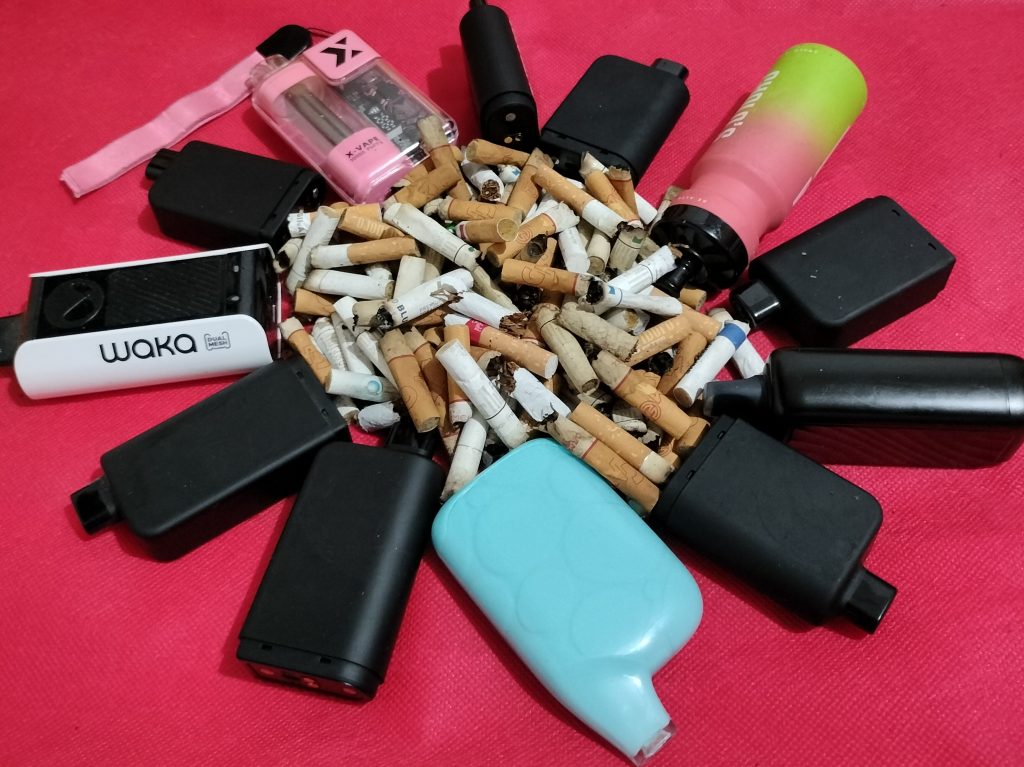
QUEZON CITY — Two civil society organizations dedicated to the protection of public health and the environment pushed for an upstream solution to deal with the byproduct waste of smoking and vaping.
The Action on Smoking and Health-Philippines (ASH Philippines) and the EcoWaste Coalition in a joint press release in time for the World Health Day on April 7 called for a phase-out of tobacco products such as cigarettes and electronic smoking devices (ESDs) to safeguard the health of the people and the planet from these addictive and injurious products, and their unrecyclable byproducts.
ESDs include e-cigarettes or vapes, heated tobacco products (HTPs), and other similar electronic devices that may contain tobacco, nicotine, e-liquids, and even derivatives of cannabis.
According to the groups, there is no reasonable method to collect discarded butts from both cigarettes and ESDs, and even the tobacco containing heat sticks/plugs that are used in HTPs. And even if some cigarette filters and used ESDs can be collected, there is no practical way to recycle them.
“The only solution to tobacco and related product waste is upstream, meaning keep them from being produced, marketed and used in the first place,” said Dr. Maricar Limpin, executive director, ASH Philippines. “These unnecessary, addictive and deadly products need to be phased out to protect people’s health and the environment amid the climate change, biodiversity loss, and pollution crisis afflicting the planet.”
“Among other reasons, cigarettes and ESDs are problematic for the environment because they are not easily recycled due to their toxic makeup. More often than not, discarded butts and ESDs end up in dumpsites or in the oceans where they can persist for a long time,” said Aileen Lucero, national coordinator, EcoWaste Coalition. “Like single-use plastics, a phase-out program for tobacco and related products has to be developed, including a just transition to alternative economic opportunities for the affected sectors.”
There is no reasonable method to collect post-consumer cigarettes and ESDs, the groups observed.
Trillions of butts and billions of ESDs and their components, including discarded packaging, enter the environment every year. No amount of beach combing or street sweeping will ever make a noticeable dent in these numbers, although organized cleanups are a good way to illustrate the problem.
Multiple schemes have been tried to give consumers a good way to dispose of butts and ESDs, and all have failed. Part of the reason for that is there is no safe way to dispose of them. They are toxic waste and should not be mixed with regular discards.
ESDs have the added complication of batteries, printed circuit boards (PCBs), heating coils, and other parts integrated into the product design, which are known to explode and cause fires. In fact, there are schools across the country with closets full of confiscated ESDs because there is no way to properly get rid of them.
There is no practical way to recycle cigarette butts and spent ESDs, the groups noted.
Cigarette butts are made of cellulose acetate, a problematic plastic that requires more expensive recycling processes than other plastics. More importantly, they are full of carcinogens and toxins. Any product they are made into will also be full of carcinogens and toxins, not to mention the danger to those working in recycling facilities.
ESDs are also mostly plastic and full of toxins, with the added problem of the batteries and other electronic components ending up as e-waste. Separating the batteries and metal parts from the plastic shell is a prerequisite to recycling, but there is no known mechanical way to do that. Even if there was, the danger of fires and leaching makes recycling impractical.
Together with other groups, ASH and the EcoWaste Coalition are one in calling on smokers and vapers to quit smoking and vaping cold turkey, and for the youth and non-smokers in particular not to start at all, to protect their health and the health of people around them, as well as the health of the environment.
